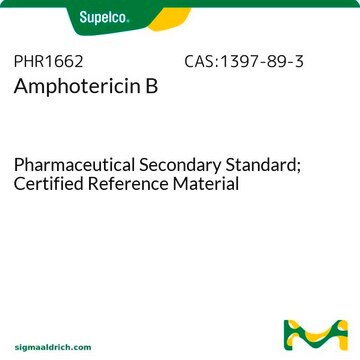SML0425
Caspofungin diacetate
≥97% (HPLC), powder, antifungal drug
Synonym(s):
1-[(4R,5S)-5-[(2-Aminoethyl)amino]-N2-(10,12-dimethyl-1-oxotetradecyl)-4-hydroxy-L-ornithine]-5-[(3R)-3-hydroxy-L-ornithine]-pneumocandin B0
About This Item
Recommended Products
product name
Caspofungin diacetate, ≥97% (HPLC)
Assay
≥97% (HPLC)
form
powder
color
white to beige
solubility
H2O: 15 mg/mL (clear solution)
shipped in
wet ice
storage temp.
−20°C
SMILES string
CC([O-])=O.CC([O-])=O.CC[C@H](C)C[C@H](C)CCCCCCCCC(=O)N[C@H]1C[C@@H](O)[C@@H](NCC[NH3+])NC(=O)[C@@H]2[C@@H](O)CCN2C(=O)[C@@H](NC(=O)[C@@H](NC(=O)[C@@H]3C[C@@H](O)CN3C(=O)[C@@H](NC1=O)[C@@H](C)O)[C@H](O)[C@@H](O)c4ccc(O)cc4)[C@H](O)CC[NH3+]
InChI
1S/C52H88N10O15.2C2H4O2/c1-5-28(2)24-29(3)12-10-8-6-7-9-11-13-39(69)56-34-26-38(68)46(55-22-21-54)60-50(75)43-37(67)19-23-61(43)52(77)41(36(66)18-20-53)58-49(74)42(45(71)44(70)31-14-16-32(64)17-15-31)59-48(73)35-25-33(65)27-62(35)51(76)40(30(4)63)57-47(34)72;2*1-2(3)4/h14-17,28-30,33-38,40-46,55,63-68,70-71H,5-13,18-27,53-54H2,1-4H3,(H,56,69)(H,57,72)(H,58,74)(H,59,73)(H,60,75);2*1H3,(H,3,4)/t28-,29+,30+,33+,34-,35-,36+,37-,38+,40-,41-,42-,43-,44-,45-,46-;;/m0../s1
InChI key
OGUJBRYAAJYXQP-IJFZAWIJSA-N
Looking for similar products? Visit Product Comparison Guide
General description
Application
- in an antifungal susceptibility test
- as a standard antifungal for valproic acid (VPA)-synergy assessment
- to treat Cryptococcus neoformans strain B3501 to study natural killer (NK) cell killing of Cryptococcus in the presence of β-1,3-glucan
Biochem/physiol Actions
Storage Class Code
11 - Combustible Solids
WGK
WGK 3
Flash Point(F)
Not applicable
Flash Point(C)
Not applicable
Regulatory Listings
Regulatory Listings are mainly provided for chemical products. Only limited information can be provided here for non-chemical products. No entry means none of the components are listed. It is the user’s obligation to ensure the safe and legal use of the product.
JAN Code
SML0425-VAR:
SML0425-BULK:
SML0425-5MG:
SML0425-25MG:
Certificates of Analysis (COA)
Search for Certificates of Analysis (COA) by entering the products Lot/Batch Number. Lot and Batch Numbers can be found on a product’s label following the words ‘Lot’ or ‘Batch’.
Already Own This Product?
Find documentation for the products that you have recently purchased in the Document Library.
Customers Also Viewed
Articles
Bioactive small molecules for immune system signaling target identification/validation and antibiotics, antivirals, and antifungals offered.
Our team of scientists has experience in all areas of research including Life Science, Material Science, Chemical Synthesis, Chromatography, Analytical and many others.
Contact Technical Service












